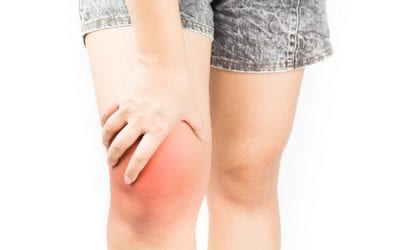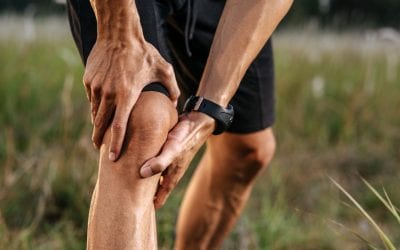We discuss a common presentation in orthopaedics – knee pain.
What could be causing your knee pain?
The knee joint is made up of bones, cartilage, muscle, tendons and ligaments. There are many things which could cause knee pain by causing damage to a component of the knee joint. Injury to the knee can often occur and involves a tear or sprain of the ligaments, tendons or cartilage that hold your knee joint together. Your kneecap (patellar) may have dislocated or, rarely, you may have a fracture. Inflammation in the joint, for example in the tendon (tendonitis) or fluid sac above the kneecap (bursitis) can also cause pain from overuse or exercise. Some conditions that can cause knee pain include osteoarthritis or inflammatory arthritis such as rheumatoid arthritis, psoriatic arthritis, gout or pseudogout.
What factors make you more at risk of knee pain?
As the knees bear a lot of weight from our bodies, factors can put strain on the knees such as being overweight, muscles that are weak or inflexible, overuse in your job or exercise, and previous injury. Trauma during exercises is one of the commonest causes of acute knee pain. Genetic factors can mean you are more at risk from some conditions such as types of arthritis.
How can you alleviate your knee pain at home?
You can take over the counter painkillers according to the dosage guidelines; ibuprofen should always be taken with food. Topical anaesthetics such as ibuprofen gel or Deep Heat may also soothe the joint. Apply ice packs or heat or use a compression bandage if directed to by your doctor, and keep your knee elevated if swollen. In cases of chronic pain, splinting, walking aids or orthotics (insoles in your shoes) may help.
What activities can you still do with knee pain?
If your knee pain is made worse by exercise or activity, you should rest and return to exercise gradually. If your pain limits your ability to work, you should contact occupational health who will discuss with you what adaptations can be made until your knee has recovered. Some types of pain are constant and may be made better with exercise, for example pain caused by rheumatoid arthritis in the knee. Gentle exercise which will strengthen the leg muscles, including yoga or swimming, and walking (low-impact exercise) may be beneficial for knee pain.
How do you know if your knee pain is serious?
You should see a specialist about your knee pain if it is a new pain, is severe or limiting your daily activities, or has associated symptoms such as redness, swelling or is hot. In addition, if your knee feels unstable or is giving way, consult a doctor. Most knee symptoms settle within 4-6 weeks so If it hasn’t subsided, get in touch. (hyperlink)
Who should you see about your knee pain?
If you are worried about your knee pain, you should consult a healthcare professional such as your GP, or a physiotherapist. You may be referred to a specialist doctor such as an orthopaedic surgeon for diagnosis and treatment options.
How is the cause of knee pain usually diagnosed?
After taking a clinical history about your knee pain, the doctor will examine your knee. You may also require imaging such as an x-ray and commonly an MRI scan. Other scans such as a CT scan or ultrasound may be required to assist in the diagnosis.

Conclusion
There are many causes of knee pain and if your symptoms have not settled, get in touch or call 0161 772 961 to book in now for an assessment.




